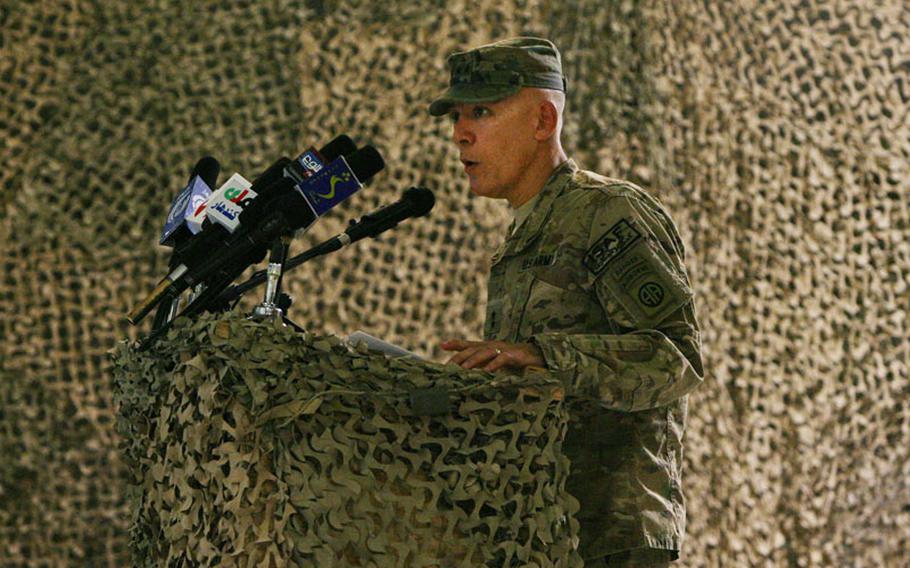
Regional Command-South Commanding General, Maj. Gen. James L. Huggins Jr., speaks during a Sept. 2 Transfer of Authority ceremony at Kandahar Airfield, Afghanistan. Huggins, of the 82nd Airborne Division, transferred authority of RC-South to Maj. Gen. Robert B. Abrams of the 3rd Infantry Division. (Laura Rauch/Stars and Stripes)
KANDAHAR AIRFIELD, Afghanistan — When now-Maj. Gen. James L. Huggins Jr. first arrived in Afghanistan in 2002, he said he saw a terrorized, war-weary nation bereft of infrastructure, a formal government or any real security apparatus. Viewed within that context, he considers the transformation during the last 10 years somewhat remarkable.
“There is a lot of progress, and some people forget about that,” said Huggins, who spent last year as commander of NATO forces in Afghanistan’s Regional Command-South.
A third-generation soldier, Huggins represents the legacy of enlisted men. Even when pressed, he’s reticent to speak about himself or the achievements of his 82nd Airborne Division. He uses nearly every inquiry to showcase Afghan achievements, especially those of the Afghan National Security Forces.
In a ceremony Sept. 2, Huggins transferred authority of RC-South to Maj. Gen. Robert B. Abrams, of the 3rd Infantry Division. He leaves behind Afghan National Security Forces that he says are better prepared than many realize.
Throughout the buildup of the Afghan security forces, much of the push has been to create infrastructure and to fill the ranks of the Afghan army and police. Now that they’re nearing capacity, they are able to focus more on training and operations while gaining the expertise to operate autonomously.
“Capacity has increased, but now with our partners, we’re focusing on developing capability,” he said. “And we’ve seen some real progress, most notably in the army, their ability to conduct operations, plan operations and execute them,” he said. “I’m not trying to be overly optimistic, but it is a trend that they are being able to sustain.”
Huggins also said that even though there have been some high-profile attacks, violence overall is down in RC-South. He cited Kandahar city as a prime example where, according to International Security Assistance Force data, violence fell nearly 70 percent from March 2011 to March 2012.
“I’ve had police headquarters assaulted (in the south). I’ve had bases infiltrated, but they’re still there, some tragic loss of life with all those, but the ANSF forces are still there.”
While encouraged, he said he is also realistic.
“Logistics is an Achilles heel for them,” he said. “They’re making progress in the general support units, but they are going to have to develop it.
“Where we’ve got some strong leaders, it’s continued to pick up momentum in terms of good district governors and police chiefs. W just need to get that more pervasive,” Huggins said.
His greatest concern is that the Afghan government hasn’t developed as quickly as the security forces, and he fears that in the wake of the downsizing of NATO forces, security standards will slip.
“In terms of governance, there is a gap,” Huggins said. “Unfortunately, my belief is, we’ll fall to the level of wherever governance is, and I’m hoping that if we continue to invest in development, that will be good enough. That will be sustainable to keep the security conditions where they are right now.”
He agrees that the proliferation of insider attacks should be met with increased resolve for NATO to strengthen its ties with Afghan security forces rather than allow their partnership to be weakened by fractures.
“The natural tendency … is we’re going to have to separate because we’re worried about this inside-the-wire threat. I actually believe we have to come closer, we have to build more trust, and we have to depend on each other more,” he said.
Huggins said he believes the Taliban have lost momentum in the south and cites several key indicators that point to fissures in their network, including recruiting difficulties and a poor poppy harvest.
“Between the peace talks and these other pieces of friction, the network lacks competence. So it is, in my mind, at a great tipping point,” he said.
Huggins, who was recently nominated for a third star, returned last week to Fort Bragg, N.C., where he will spend time with his wife and three daughters before heading to his new role at the Pentagon as Army deputy chief of staff for operations and plans.
“I’ll do whatever they tell me to do,” Huggins said about his plans with his family. “They’re in charge. I’ve had enough opportunity to be in charge on this end. I will not mind pampering them for the year I missed with them.”